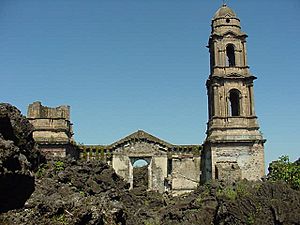Nuevo San Juan Parangaricutiro facts for kids
Quick facts for kids
Nuevo San Juan Parangaricutiro
|
||
|---|---|---|

|
||
|
||
| Motto(s):
El pueblo que se negó a morir
|
||
| Country | ||
| State | Michoacán | |
| Municipality | Nuevo Parangaricutiro | |
| Population
(2020)
|
||
| • Total | 16 745 | |
Nuevo San Juan Parangaricutiro is a small village in the Mexican state of Michoacán. It is located near the famous Parícutin volcano. The word Nuevo means "new" in Spanish. This is because the original village of San Juan Parangaricutiro was destroyed. It was buried by ash and lava when the Parícutin volcano formed in 1943.
Today, you can still see the top of the old church sticking out from the volcanic rock. Nuevo San Juan Parangaricutiro is the main town for the municipality of Nuevo Parangaricutiro.
This village is also known by a very long name: Parangaricutirimícuaro. It's the longest place name in Mexico! Some people think it's just a fun urban legend. The name is often used in tongue-twisters, like this one: "El pueblo de Parangaricutirimícuaro se va a desparangaricutirimicuarizar. Quien logre desparangaricutirimicuarizarlo buen desparangaricutirimicuarizador será."
Where is Nuevo San Juan?
Nuevo San Juan Parangaricutiro is located in central Michoacán. It is about 8 kilometers (5 miles) west of Uruapan. The village is also about 16 kilometers (10 miles) east of the peak of the Parícutin volcano. The village’s postal code is 60490.
The Community Forest
Nuevo San Juan is home to the Purépecha people. This is an indigenous group that owns and manages a large area of land together. Their communal lands cover over 18,000 hectares (44,000 acres). About 12,000 hectares (30,000 acres) of this land is a beautiful temperate forest.
In the 1970s, the Purépecha community took control of their forest businesses. By 1997, they earned a special certificate for managing their forest well. This certificate came from the Forest Stewardship Council.
In 2004, the community won the Equator Prize. This award is part of the United Nations Development Programme. It celebrates communities that work hard to reduce poverty while protecting nature. The Purépecha people are a great example of this.
Every year, they produce about 65,000 cubic meters (2.3 million cubic feet) of timber. They use the forest to make many products. These include resins, wood for building, furniture, and even parts for paper. They also build cabins from the wood.
See also
 In Spanish: Nuevo San Juan Parangaricutiro para niños
In Spanish: Nuevo San Juan Parangaricutiro para niños
 | Georgia Louise Harris Brown |
 | Julian Abele |
 | Norma Merrick Sklarek |
 | William Sidney Pittman |



